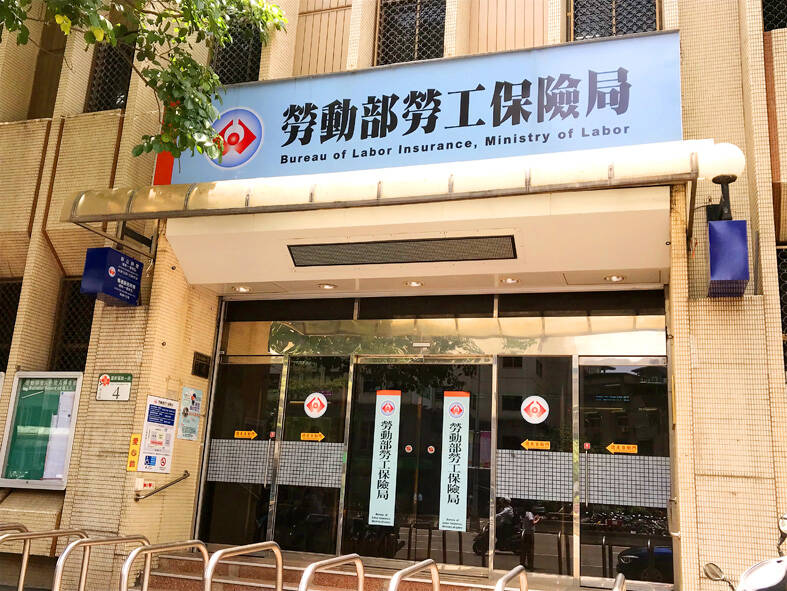Funds managed by the Ministry of Labor’s Bureau of Labor Funds earned returns of more than NT$470 billion (US$14.86 billion) in the first half of this year from their investments in Taiwan’s booming stock market, figures released by the bureau showed earlier this week.
The funds managed by the bureau, such as the Labor Pension Fund, the Labor Retirement Fund, the Labor Insurance Fund, the Employment Insurance Fund and the Arrear Wage Payment Fund, posted gains of NT$470.98 billion during the six-month period, for a rate of return of 8.59 percent.
The funds more than offset the NT$352.9 billion they lost last year, when the TAIEX plunged 4,081.15 points, or 22.4 percent, and Taiwan Semiconductor Manufacturing Co (TSMC, 台積電), the most heavily weighted stock on the local market, lost 27 percent.

Photo: Lee Chin-hui, Taipei Times
In the first half of this year, the TAIEX rose 19.35 percent, while TSMC shares surged about 26 percent, Taiwan Stock Exchange data showed.
The new Labor Pension Fund, launched in July 2015, had NT$3.79 trillion in assets as of the end of June, the most of any of the labor funds, and reported a rate of return of 8.38 percent in the first half, the bureau said.
The Labor Retirement Fund, which has been in place since 1984, had NT$998.8 billion in assets and reported a rate of return of 10.00 percent in the six-month period, the bureau said.
Overall, the funds managed by the Bureau of Labor Funds had combined assets of NT$5.86 trillion as of the end of June and generated NT$178.08 billion in returns in June alone.
That was the third-highest monthly gain on record, trailing only NT$240.23 billion in November 2020 and NT$191.32 billion in November last year, the bureau said.
Bureau of Labor Funds Deputy Director-General Liu Li-ju (劉麗茹) said the funds the agency manages have built positions in electronics stocks because the nation’s electronics industry, including TSMC, has stayed ahead of its peers in terms of global competition.
Judging from the performance of the local stock market last month, Liu said she expected the funds to post a gain of about NT$100 billion for last month. The TAIEX last month rose 229.89 points, or 1.89 percent.
From January 2013 to June this year, the funds have had an average 4.99 percent rate of return, she said.

SELL-OFF: Investors expect tariff-driven volatility as the local boarse reopens today, while analysts say government support and solid fundamentals would steady sentiment Local investors are bracing for a sharp market downturn today as the nation’s financial markets resume trading following a two-day closure for national holidays before the weekend, with sentiment rattled by US President Donald Trump’s sweeping tariff announcement. Trump’s unveiling of new “reciprocal tariffs” on Wednesday triggered a sell-off in global markets, with the FTSE Taiwan Index Futures — a benchmark for Taiwanese equities traded in Singapore — tumbling 9.2 percent over the past two sessions. Meanwhile, the American depositary receipts (ADRs) of Taiwan Semiconductor Manufacturing Co (TSMC, 台積電), the most heavily weighted stock on the TAIEX, plunged 13.8 percent in

A wave of stop-loss selling and panic selling hit Taiwan's stock market at its opening today, with the weighted index plunging 2,086 points — a drop of more than 9.7 percent — marking the largest intraday point and percentage loss on record. The index bottomed out at 19,212.02, while futures were locked limit-down, with more than 1,000 stocks hitting their daily drop limit. Three heavyweight stocks — Taiwan Semiconductor Manufacturing Co (TSMC, 台積電), Hon Hai Precision Industry Co (Foxconn, 鴻海精密) and MediaTek (聯發科) — hit their limit-down prices as soon as the market opened, falling to NT$848 (US$25.54), NT$138.5 and NT$1,295 respectively. TSMC's

ASML Holding NV, the sole producer of the most advanced machines used in semiconductor manufacturing, said geopolitical tensions are harming innovation a day after US President Donald Trump levied massive tariffs that promise to disrupt trade flows across the entire world. “Our industry has been built basically on the ability of people to work together, to innovate together,” ASML chief executive officer Christophe Fouquet said in a recorded message at a Thursday industry event in the Netherlands. Export controls and increasing geopolitical tensions challenge that collaboration, he said, without specifically addressing the new US tariffs. Tech executives in the EU, which is

In a small town in Paraguay, a showdown is brewing between traditional producers of yerba mate, a bitter herbal tea popular across South America, and miners of a shinier treasure: gold. A rush for the precious metal is pitting mate growers and indigenous groups against the expanding operations of small-scale miners who, until recently, were their neighbors, not nemeses. “They [the miners] have destroyed everything... The canals, springs, swamps,” said Vidal Britez, president of the Yerba Mate Producers’ Association of the town of Paso Yobai, about 210km east of capital Asuncion. “You can see the pollution from the dead fish.